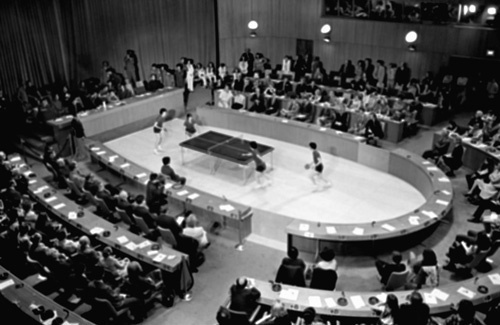Scoops, pests and ping pong diplomacy
- By Geoffrey Murray
 0 Comment(s)
0 Comment(s) Print
Print E-mail
China.org.cn, August 16, 2011
E-mail
China.org.cn, August 16, 2011
|
|
|
Picture is accorded a hearty welcome to the Chinese table tennis players at the General Headquarter of United Nations, playing a demonstration match on April 19, 1972. |
Every ambitious journalist dreams of "scoops." One of mine came in Japan, in 1971, when I reported that China had invited an American table tennis team to visit the mainland.
Doesn't sound much today, perhaps, but this was the "ping pong diplomacy" that led President Richard Nixon to visit China in 1972 and the establishment of diplomatic relations seven years later. And it comes to mind every time I read of a blip in Sino-American relations.
I was in Nagoya covering the 31st world table tennis championship for Reuters news agency. The big interest was the return of China to international competition.
After practice one day, the American player Glenn Cowan missed his team bus and was invited onto the Chinese one. He was greeted by male champion Zhuang Zedong, who presented him with a silk-screen portrait of Huangshan (mountains), a famous product from Hangzhou.
In a 2002 TV interview, Zhuang recalled: "The trip on the bus took 15 minutes, and I hesitated for 10 minutes. I grew up with the slogan 'Down with American imperialism!'" With the Cultural Revolution, still in progress at home, he wondered was it okay "to have anything to do with your No. 1 enemy."
However, he remembered Chairman Mao had met the famous American journalist Edgar Snow on the rostrum of Tiananmen Square during the 1970 National Day celebrations and told Snow how China placed its hopes on the American people.
So, Zhuang rummaged in his bag for a suitable gift, and from that small gesture arose the thought of the Americans visiting the mainland.
At first, the Chinese Ministry of Foreign Affairs said no. Chairman Mao, after initially concurring, later changed his mind, and on April 10, 1971, the Americans crossed from Hong Kong into the mainland for a week of friendly matches and sightseeing.
In Nagoya, I spent every day in the stands with binoculars closely monitoring every match. To my annoyance, an American fan planted herself next to me and kept distracting me with idle chatter. However, she illustrates a point I make in my journalism lectures that "you never know who can become a source for a good story."
One day, she turned up obviously excited. "What's up?" I asked. "Oh," she gushed, "the Chinese have invited the team to visit the mainland." I went in search of the U.S. team manager for confirmation, then rushed to the teleprinter in my office beneath the stand and within minutes the news reached Reuter clients worldwide.
There is a saying: "Mighty oaks from little acorns grow." In other words, big things can come from very small beginnings. Chairman Mao's conversation with Edgar Snow and the invitation to the table tennis team were subtle signs Beijing wanted to seek ways out of Cold War stalemate, a message not lost on President Nixon and Henry Kissinger.
Go to Forum >>0 Comment(s)
 Add your comments...
Add your comments...
- User Name Required
- Your Comment
- Racist, abusive and off-topic comments may be removed by the moderator.






